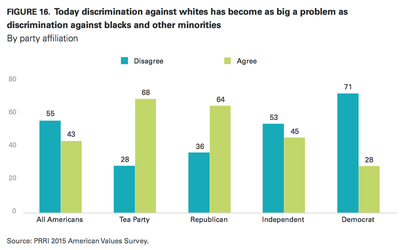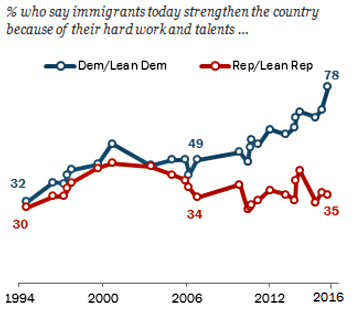Over at Vox, we’re having a battle of the charts. Matt Yglesias says this is the one chart you need to understand Donald Trump’s popularity in the Republican Party:

But no! Dara Lind says this is the one chart you need:

Needless to say, there’s no real disagreement here. Both writers are suggesting that Trump is winning because he appeals to a Republican Party base that thinks white people are getting screwed and doesn’t much like all the non-white people they think are doing the screwing. So they’re all pretty happy about Trump’s wall and his proposed Muslim ban and his endless griping about “political correctness.” At its core, Trump’s appeal is fundamentally racist.
I think it’s safe to say that nearly all liberals believe this. There’s voluminous evidence beyond just these two charts, after all. But here’s my question: what should we do about it? This has been bugging me for a while.
If we attack it head on—”Republicans are racists!”—it accomplishes nothing. Or worse than nothing: it pisses off our targets so badly that they’ll never hear another word we say. Besides, it’s all but impossible to prove that racism is at the core of any particular belief, and doubly impossible to do so in the case of any particular person. It’s also really easy to go overboard on charges of racism once you get started.
Alternatively, knowing that this is a political loser, we can skirt the direct charges of racism and focus instead on tangentially related topics. The upside is that we have at least a chance of winning over some voters who aren’t too far gone. The downside, obviously, is that we’re avoiding the elephant in the room. How do you fight racism if you’re not willing to talk directly about it?
I don’t have a good answer. Accusing people of racism is the fastest way to shut down a conversation and ensure implacable opposition. Avoiding racism is the fastest way to make sure nothing serious ever gets done about it. So what’s the right approach?















